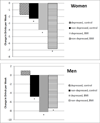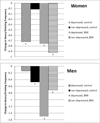Gender and depression moderate response to brief motivational intervention for alcohol misuse among college students
- PMID: 24865872
- PMCID: PMC4244268
- DOI: 10.1037/a0037039
Gender and depression moderate response to brief motivational intervention for alcohol misuse among college students
Abstract
Objective: Brief motivational interventions (BMIs) effectively reduce problematic drinking in college students. However, not all students benefit, and little is known about the subgroups of students for whom BMIs are most effective. In the present study, we examined 2 factors that may influence BMI efficacy: gender and depression.
Method: We reanalyzed data from a clinical trial in which heavy drinking students (N = 330; 65% female) were randomized to a BMI (n = 165) or an assessment only control (n = 165). Depression was assessed at baseline; past-month typical drinks per week, heavy drinking frequency, and consequences were assessed at baseline and 1 month. Three- and 2-way interactions among intervention condition (BMI vs. control), gender (male vs. female), and depression (low vs. high) were tested.
Results: We observed 3-way interaction effects on 2 outcomes: (a) typical drinks per week and (b) frequency of heavy drinking at 1 month. Relative to controls and adjusting for baseline drinking, low-depression women reduced their drinking more after a BMI whereas high-depression women did not show differential improvement. In contrast, high-depression men showed significant reductions in weekly drinks following the BMI whereas low-depression men did not show differential improvement. In addition, higher levels of depression were associated with higher levels of consequences at follow-up across conditions.
Conclusions: BMIs are indicated for heavy drinking, depressed men, consistent with recommendations for implementing screening and brief intervention in mental health settings. However, BMIs may need to be refined to enhance their efficacy for depressed women.
Figures
Similar articles
-
Brief alcohol interventions for mandated college students: comparison of face-to-face counseling and computer-delivered interventions.Addiction. 2011 Mar;106(3):528-37. doi: 10.1111/j.1360-0443.2010.03193.x. Epub 2010 Nov 9. Addiction. 2011. PMID: 21059184 Free PMC article. Clinical Trial.
-
A Novel Approach for Streamlining Delivery of Brief Motivational Interventions to Mandated College Students: Using Group and Individual Sessions Matched to Level of Risk.Subst Use Misuse. 2017 Dec 6;52(14):1883-1891. doi: 10.1080/10826084.2017.1318148. Epub 2017 Aug 16. Subst Use Misuse. 2017. PMID: 28812420 Free PMC article.
-
Response of heavy-drinking voluntary and mandated college students to a peer-led brief motivational intervention addressing alcohol use.J Subst Abuse Treat. 2014 Nov-Dec;47(5):321-8. doi: 10.1016/j.jsat.2014.06.005. Epub 2014 Jun 28. J Subst Abuse Treat. 2014. PMID: 25073447 Free PMC article. Clinical Trial.
-
Do brief motivational interventions increase motivation for change in drinking among college students? A two-step meta-analysis of individual participant data.Alcohol Clin Exp Res (Hoboken). 2023 Aug;47(8):1433-1446. doi: 10.1111/acer.15126. Epub 2023 Jun 14. Alcohol Clin Exp Res (Hoboken). 2023. PMID: 37526588 Free PMC article. Review.
-
Beyond BASICS: A scoping review of novel intervention content to enhance the efficacy of brief alcohol interventions for emerging adults.Psychol Addict Behav. 2022 Sep;36(6):607-618. doi: 10.1037/adb0000811. Epub 2022 Jan 27. Psychol Addict Behav. 2022. PMID: 35084904
Cited by
-
The association between alcohol consumption and self-reported current depression among adults residing in Brazil.J Public Health (Oxf). 2021 Jun 7;43(2):e204-e212. doi: 10.1093/pubmed/fdaa220. J Public Health (Oxf). 2021. PMID: 33367910 Free PMC article.
-
Drinking Over the Lifespan: Focus on College Ages.Alcohol Res. 2016;38(1):103-14. Alcohol Res. 2016. PMID: 27159817 Free PMC article. Review.
-
The role of underutilization of protective behavioral strategies in the relation of social anxiety with risky drinking.Addict Behav. 2020 Jan;100:106122. doi: 10.1016/j.addbeh.2019.106122. Epub 2019 Sep 5. Addict Behav. 2020. PMID: 31610479 Free PMC article.
-
A randomized clinical trial evaluating the efficacy of a brief alcohol intervention supplemented with a substance-free activity session or relaxation training.J Consult Clin Psychol. 2019 Jul;87(7):657-669. doi: 10.1037/ccp0000412. Epub 2019 May 9. J Consult Clin Psychol. 2019. PMID: 31070386 Free PMC article. Clinical Trial.
-
Examining parental monitoring as a moderator of the relationship between depressed mood and alcohol use and problems.Addict Behav. 2018 Jun;81:117-124. doi: 10.1016/j.addbeh.2018.02.011. Epub 2018 Feb 9. Addict Behav. 2018. PMID: 29454811 Free PMC article.
References
-
- Addis ME, Mahalik JR. Men masculinity, and the contexts of help seeking. American Psychologist. 2003;58(1):5–14. - PubMed
-
- Aiken LS, West SG. Multiple regression: Testing and interpreting interactions. Thousand Oaks, CA US: Sage Publications, Inc.; 1991.
-
- American College Health Association. American College Health Association-National College Health Assessment II: Reference Group Data Report Spring 2013. Hanover, MD: American College Health Association; 2013.
-
- American Psychiatric Association. Diagnostic and statistical manual of mental disorders, (4 th ed, Text Revision) Washington DC: American Psychiatric Association; 2000.
-
- Benton SL, Schmidt JL, Newton FB, Shin K, Benton SA, Newton DW. College student protective strategies and drinking consequences. Journal of Studies on Alcohol. 2004;65(1):115–121. - PubMed
Publication types
MeSH terms
Grants and funding
LinkOut - more resources
Full Text Sources
Other Literature Sources
Medical
Miscellaneous



